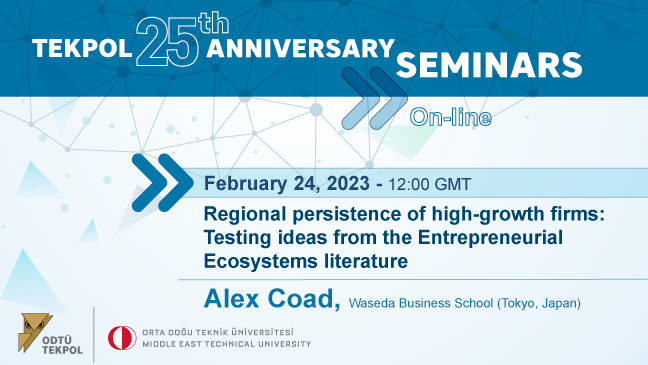TEKPOL 25th Year Anniversary Seminars_Alex Coad_24022023
Last Updated:
- English
- Türkçe
Dear TEKPOL Partners,
This year we will be celebrating the 25th Anniversary of METU-TEKPOL. We believe it will be a valuable opportunity to reconnect with our partners all over the globe working in the field of science and technology policy making and decided to host a series of online seminars through out the year.
Our first guest will be Alex Coad, from Waseda Business School (Tokyo, Japan) and his presentation title is: Regional persistence of high-growth firms: Testing ideas from the Entrepreneurial Ecosystems literature.
The seminar will be held on 24 February (Friday) 2023, at 12:00 GMT, through ZOOM. The Zoom link will be shared with the registered participants before the session.
The moderation of the seminar will be conducted by Prof. Dr. Teoman Pamukcu from METU TEKPOL.
Registration is mandatory and the form can be reached through this link:
https://forms.gle/WaDg46oNaZxFsRnN8
It is possible to register until Thursday evening before the seminar (23 February 2023)
Kind Regards,
TEKPOL, Science and Technology Policy Research Center
About Alex Coad:
Alex Coad is a Professor at Waseda Business School (Tokyo, Japan), and is interested in the areas of firm growth, firm performance, entrepreneurship, and innovation policy. Alex has published over 90 articles in international peer-reviewed journals. According to Google Scholar, Alex has over 12 000 citations and an H-index of 51. Alex is an Editor at the journals 'Research Policy' (Financial Times Top 50 list of journals for Business Schools) and 'Small Business Economics', and Associate Editor at 'Industrial and Corporate Change'. Previously Alex obtained a PhD from Université Paris 1 Panthéon-Sorbonne and the Sant'Anna School, Pisa, Italy, and held academic positions at the Max Planck Institute (Jena, DE), Aalborg University (Denmark), SPRU (Univ. Sussex, UK), and CENTRUM Graduate Business School (Lima, Peru), and also being an Economic Analyst at the European Commission (IRI group, JRC-IPTS, Sevilla). In December 2016, Alex received the 2016 Nelson Prize at University of California Berkeley.
About the Seminar:
This paper investigates some theoretical predictions from Entrepreneurial Ecosystem (EE) theory, i.e. predictions regarding the stated EE outputs: regional HGF shares. We analyse regional HGF shares in NUTS-3 and NUTS-2 regions in Europe, drawing on Eurostat data for up to 20 countries, over the period 2008-2020. Analysis of regional rankings yields the puzzling finding that the leading entrepreneurial ecosystems in Europe, apparently, are in places such as the Canary Islands, South Italy, and the Centro region of Portugal. These places would not normally be considered Europe's foremost entrepreneurial hotspots. Correlations, scatterplots, and regressions are used to test our hypotheses. We find support for the hypothesis that regions display persistence in their regional HGF shares over time, although this is driven (to some extent) by outliers. However, we do not find strong support for the hypothesis that more developed regions, or more innovative regions, have stronger Entrepreneurial Ecosystems, because these regions do not have higher regional HGF shares. There is also insufficient support for the hypothesis that more developed regions (or more innovative regions) have higher persistence in their regional HGF shares. Overall, policymakers are advised to be cautious regarding whether the EE framework can actually generate its stated outputs in terms of boosting a region's HGF share.
Confirmed Speakers of the TEKPOL 25th Anniversary Seminars:
February 24th - Alex Coad, Waseda Business School, Japan
March 10th - Armin Grunwald, Institute for Technology Assessment and Systems Analysis, Germany
March 24th - Uwe Cantner, University of Jena, Germany
April 7th - Simona Iammarino, London School of Economics, UK
May 26th - Ugo Fratesi, Politecnico di Milano, Italy
















